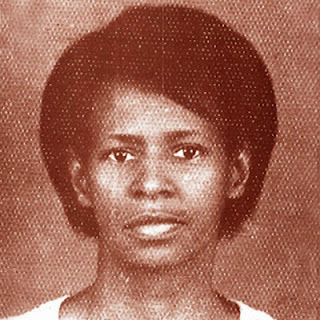song-writer Helena dos Santos & Roberto Carlos.
Helena dos Santos was born on 7 January 1922, in Conselheiro Lafaiete-MG.
Francisco dos Santos was her father and Maria Amália her mother, who died while Helena was still very young. Francisco re-married and Helena lived with him and step-mother until 1934 when she was 12 years old. Maria Augusta, her older sister married and moved to Rio de Janeiro-DF; Helena saw her chance to scape the humdrum of a small town and joined her sister and brother-in-law into the Brazilian capital city.
In Rio, Helena first worked as a labourer at a textile factory, then at a men's clothing shop at Rua Frei Caneca, downtown where she learned how to sew. During this time she was a victim of a commuter train crash at Central do Brasil railway and had to stay home for 2 years until she got her health back and went to work as a char-woman.
In 1949, when Helena was 17, she met Lauro de Oliveira, originally from Cabo Frio-RJ who worked at the same factory as her. Soon they got married. Lauro and Helena worshipped at São Cristovão's Pentecostal Church where he was active in the choir. Lauro wrote songs and hymns for it and Helena used to sit down and help him on rhymes and rhythm. Unfortunately,
Lauro had an untimely death in 1961, leaving Helena with 5 children and an unborn baby.
After Lauro's death, Helena started writing non-religious songs like ballads and sambas which she would take to radio stations in the hope of getting the attention of singers like Orlando Silva or Carlos Galhardo to listen to her ditties. She was on the verge of giving that up altogether when one afternoon, at popular DJ Luiz de Carvalho daily show at Radio Globo, she managed to get the attention of Roberto Carlos, a Columbia recording artist who took the time to listen to some of her songs. Here's what Helena herself tells:
- Roberto Carlos foi extremamente atencioso comigo. Ouviu minhas queixas e depois pediu para ouvir minhas músicas. Cantei para ele 'Na lua não há', a minha música mais bonita naquele tempo. Ele achou bonita a melodia, mas disse que ia melhorar a letra. Afirmou que eu podia ficar tranquila; que ele iria gravar a minha composição.
(He was extremely attentive with me. Listened to some of my lamenting and then wanted to hear my songs. I sang 'Na lua não há' (You won't find it in the moon) which was my best song then. Roberto liked the melody and said he would make some changes in the lyrics. He told me to be at ease for he would surely record it in his next album.)
Helena was happy but as weeks turned into months she almost forgot that promise when one day, an alarmed neighbour told her she had been summoned by radio and newspaper to go to Radio Globo and talk to DJ Luiz de Carvalho about a subject of her interest. Mr Carvalho told her Roberto Carlos had recorded her song as part of the album 'Splish splash' which would be released in October 1963.
Helena dos Santos songs recorded by Roberto Carlos
1. 'Na lua não há' - Splish splash (1963)
2. 'Meu grande bem' - É proibido fumar (1964)
3. Como é bom saber - Roberto Carlos canta para a juventude (1965)
4. 'Sorrindo para mim' - Jovem Guarda (1965)
5. 'Esperando você' - Nossa canção-album (1966)
6. 'Fiquei tão triste' - B-side of Martinha's 'Eu daria a minha vida' (1967)
7. 'Nem mesmo você' - O inimitável (1968)
8. 'Do outro lado da cidade' - Pão-de-Açucar album (1969)
9. 'O astronauta' (with Edson Borges) - Jesus Cristo-album (1970)
10. 'Agora eu sei' (w Edson Borges) (1972)
11. 'Recordações' (w Edson Borges) (1982)
Helena died on 23rd October 2005 (83 years old) in Rio de Janeiro-RJ.



.PNG)
